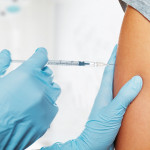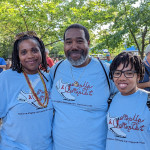I’d successfully navigated puberty and adulthood barely knowing that I possessed one sinus, not to mention eight. I was healthy and active with rarely a sniffle. Then, one holiday season about six years ago, an excruciating throb behind my eyes culminating in a shocking flow of multi-colored mucus landed me in my local emergency room in Oakland, California. Hello, sinuses!
Since then I’ve become overly intimate with the workings of my inner nose—so demanding, so darn sensitive. I’ve surfed the Web for advice and invested untold sums on remedies, books and visits to health professionals. It’s paid off: I have a story to tell, complete with facts and treatments.
When friends, concerned about my HIV, ask, “How’s your health?” I answer: “Except for my sinuses, I’m excellent.” According to Winston Vaughan, MD, director of the California Sinus Institute, a little more than one tenth of HIV-negative Americans suffer with sinusitis, yet two thirds of people with HIV do. Why so many? Dr. Vaughan cites “the drying effects of some [HIV] medications, immune changes in the sinuses and chronic inflammation” caused by the virus. My own sinus problems began after I’d been living with HIV for about eight years.
With or without HIV, sinusitis attacks are sparked by many factors, often in combination: colds or flu, allergies, nasal polyps, overuse of nasal steroids and exposure to pollutants. When the ostia—the small openings from sinuses to nasal passage—swell shut, pathogens breed quickly in accumulated secretions, causing pressure and pain.
The specific trigger may be a bacterium, virus, fungus or mold. The question of cause, Vaughan says, is “best answered on an individual basis—by careful clinical evaluation, endoscopy of the nose/sinuses, CAT scans, a nose culture, medical treatment and close follow-up.” Persistent, intractable sinusitis may require surgery. A new method nixes the scalpel and instead slips a tiny, balloon catheter into the sinuses. The catheter is then inflated to gently restructure the blocked passage.
Treat Yourself
Over time I’ve learned how to cut the frequency and severity of attacks. All year, a bedroom air filter/ionizer reduces dust, pollution and cat dander. In winter, an often cleaned, warm-mist humidifier keeps membranes moist and mucus flowing.
First thing upon waking I drink two glasses of water to rehydrate (a Christie Brinkley beauty tip!) and keep drinking all day. At the first sign of symptoms—stuffiness or headache—out comes the trusty neti pot for saline irrigation (see “Genie in a Pot,” right). I then apply a warm facial compress and/or steam my nose over a bowl of water with a few drops of eucalyptus oil or a speck of Tiger Balm.
If these fail, I pop an anti-inflammatory (ibuprofen), snort some steroid nasal spray (Flonase), then pick herbal remedies (see “Arsenal,” right). I ask Doc for the big guns—antibiotics, generally amoxicillin—only as a last resort (plus probiotics to replenish the good gut bacteria).
Air travel wreaks havoc on my nose. Besides the plane’s recycled, cootie-contaminated air, the change in pressure causes sinus membranes to swell. Before flying I take ibuprofen and swab my nasal passages with the antibiotic ointment Neosporin; in flight I moisten membranes with saline spray, drink lots of water and sometimes don an air filter mask.
It sounds loopy, but a Swedish study concluded that humming “may reduce the risk of sinusitis.” Humming increases the gas exchange between the sinuses and nasal passage, boosting nitric oxide levels. Nitric oxide, a potent dilator, brings blood and immune cells to fight off infection. Similarly, increasing blood circulation with aerobics helps alleviate sinus pain (15 to 20 minutes on the treadmill usually eases mine).
Prevention and Preemption
Some foods are to be avoided. For me, heavy dairy products produce sinus problems by thickening mucus. Food or allergic causes of sinusitis can be identified through testing. During a sinus bout, try eliminating alcohol (it swells membranes) and caffeine (it causes dehydration).
Other foods may help. Cathy Crystal, a nutrition consultant and teacher at Bauman College in Santa Cruz, California, says, “Garlic and shiitake mushrooms have strong antibacterial and virus inhibiting properties—an excellent way to ward off infections.”
In autumn I preempt “sinus season” by strengthening my nasal membranes with a daily tea concocted of peppermint, fennel, burdock and Oregon grape root. I also use astragalus in teas and soups. Crystal says, “The herb astragalus is useful for immune-compromised people. Studies show that it stimulates pituitary-adrenal cortical activity, increases red blood cell formation and stimulates the body’s natural production of interferon.”
Though my sinuses periodically rebel, we’ve reached a truce of sorts. If I baby my inner nose—avoid heavy dairy and exposure to air-born irritants, keep well hydrated and apply remedies upon first symptoms—we get along much better these days.
***
Genie in a Pot
My trusty neti pot resembles a genie’s lamp filled with warm salted water. I insert the spout in one nostril; the water flushes the nasal and sinus passages and drains from the other nostril. At first it may feel like drowning, but stick with it. In one study, people using neti pots had 72 percent fewer sinus infections and a 69 percent improvement in breathing. Some people use the pot daily: Brush teeth, irrigate sinuses, breathe.
***
Sinus Arsenal
These herbs and foods have helped me clear my sinuses. Many have antiviral, antibacterial and antifungal properties, though studies proving their effectiveness are lacking. Begin by talking to your doctor and checking for any interactions with HIV meds. Among my faves:
• Reishi and maitake mushrooms, Echinacea, astragalus and cat’s claw (uña de gato): These may help strengthen the immune system; alternate using each herb for two weeks.
• Goldenseal: Well-known antimicrobial, anti-inflammatory and astringent; I take just 1/8 tsp or a tiny pinch in the neti pot—larger doses give me the runs.
• Coptis (golden thread): Similar to goldenseal, it may also act as an anti-inflammatory for the sinuses.
• Garlic Capsules: I take these to quell a sinus attack. (Beware: they may interact with some HIV protease inhibitors.)
• Bi Yan Pian or Pe Min Kan Wan: Chinese herbal pills (at healthfood stores) used for sinusitis and allergies, often in conjunction with acupuncture.
• NutriBiotic’s grapefruit seed extract: A strong antiviral, antibacterial, antifungal taken orally (15–20 drops in water three times a day). I spritz some in my neti pot. (Unlike grapefruit juice, the extract doesn’t interact with HIV meds.)
• Tiger Balm and Basil oil: I add a tiny bit of the balm or 2–3 drops of the oil to a bowl of water for a nose-clearing steam.
The Sinus Monologues
Two thirds of people with HIV experience sinusitis. Ease the symptoms with these tips.






4 Comments
4 Comments